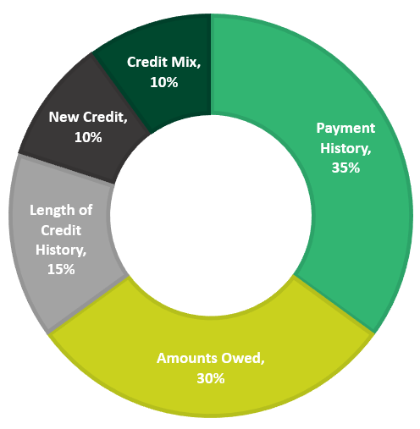
Understanding Credit

- Tab 1The Basics
- Tab 2The Score
- Tab 3Credit Reporting
- Tab 4Tips for Improving Credit
- Tab 5Additional Resources
- Tab 6
 The Basics
The Basics
What is credit?
Credit is the record of a person's history of borrowing money and repaying at a later date. If trust is a bank account then credit would be the currency. Lenders, such as banks, car dealerships, and credit card companies use credit scores to evaluate the potential risk posed by lending money to an individual.
Why do I need credit?
Having good credit can go much farther than just banking relationships. Credit scores are often pulled by insurance and utility companies, employers, and landlords. A good credit score will help ensure you have access to credit when you need it.
Prepared for informational purposes only.
The Score
What is a good score?
Scores range from 300 - 850 and a credit score of 700 or above is generally considered good. A score of 800 or above is considered to be excellent. Most credit scores fall between 600 and 750.
How do I find out what my credit score is?
While you are able to get a credit report pulled from each credit reporting agencies once a year, it may not include a credit score. TransUnion and Experian offer this information at no charge with your report while Equifax charges a fee to get all 3 scores at once.
Get Your Score
 What makes up credit?
What makes up credit?
Credit is calculated with 5 different factors; payment history, amounts owed, length of credit history, new credit, and credit mix.
Payment History accounts for 35% of your credit score. Payment history answers the question "Do you pay your bills on time?"
Amounts Owed accounts for 30% of your credit score. This is also called credit utilization and compares what you already owe to your maximum credit limits. In short, the more you already owe the riskier it may be to take on new debt.
Length of Credit History accounts for 15% of your credit score. The longer the credit history, the more information that is available to show you are a reliable borrower.
New Credit accounts for 10% of your credit score. This looks at new credit accounts opened over a period of time. If there is a large amount of new credit accounts opened in a short period of time it may adversely impact your score.
Credit Mix accounts for 10% of your score. Having mixed credit means you have different types of debt which shows you have experience managing a variety of repayment terms. Examples include mortgages, car loans, credit cards, and student loans.
Prepared for informational purposes only.
What is a credit report?
A credit report is a record of credit history from banks, credit card companies, and collection agencies. The credit reports are updated at least once a month.
What are the credit reporting agencies?
There are three national credit bureaus, Equifax, Experian, and TransUnion. The credit score from each will be similar but have slight differences in the way personal and employment data is weighted into the score.
How do I get a copy of my credit report?
You can request a free copy of your credit report once a year from each of the main credit reporting agencies Equifax, Experian, and TransUnion or from Annual Credit Report.
How do you dispute something on your credit report?
If there is something incorrect on your report, it can be resolved by filing a dispute. When filed, the credit reporting agency will investigate the dispute within 30 days. To start the process, all three major credit reporting agencies offer online disputes. You can also send a letter detailing the error with a copy of the report.
File a Dispute:
Prepared for informational purposes only.
 Tips for Improving Credit
Tips for Improving Credit
The first place to start is to obtain a copy of your credit report. From there you can start building an action plan to make improvements.
Review your Report - Look for errors in the report that could be adversely impacting your score. If there are errors, contact the credit bureaus to file a dispute.
Avoid Late Payments - Avoiding late payments helps improve the payment history part of your score. If you have trouble making payments on time, set up alerts so you know when a bill is due. CSB transaction alerts can be set up through Text Banking or you can set up recurring bill payments through BillPay.
Pay Down Balances - Keeping your credit card balance low helps with the credit utilization part of your score. This is because it improves the ratio of the amount of credit available to you. To do this try to pay off the full balance each month or aim to get the total outstanding balances at 30% or less of the total credit limit and work on paying them down.
Keep Old Accounts Open - If you have old credit cards in your wallet, that's ok, keep them open. They are actually helping your credit score. By having these older cards open it is improving your credit utilization ratio. By closing these cards it would decrease the amount of credit available to you and will make the credit utilization ratio higher.
Alerts for High Balances - If you are having trouble keeping track of your credit utilization, set up high balance alerts with your credit card company.
Limit Applying for New Accounts - While getting a credit card can increase your credit utilization, applying for a number of them in a short period of time can hurt your credit score.
Prepared for informational purposes only.
 Additional Resources
Additional Resources
Crediting Reporting Agencies
Prepared for informational purposes only.
